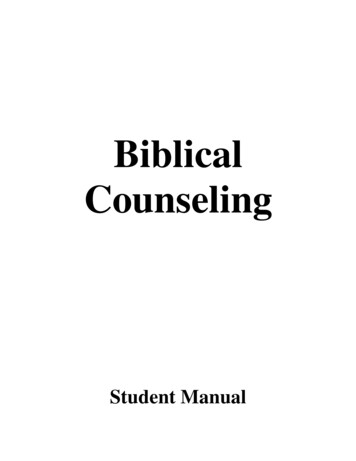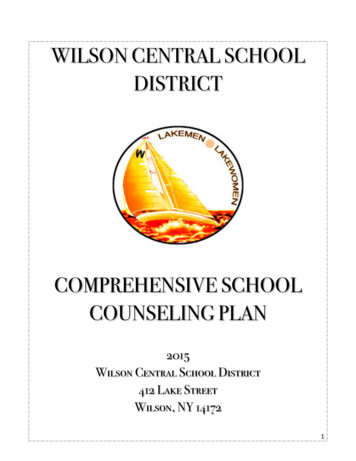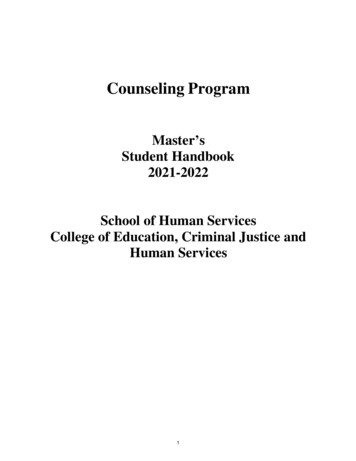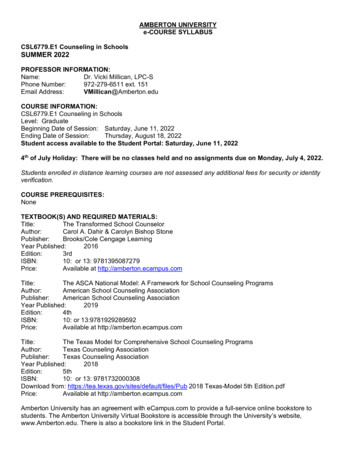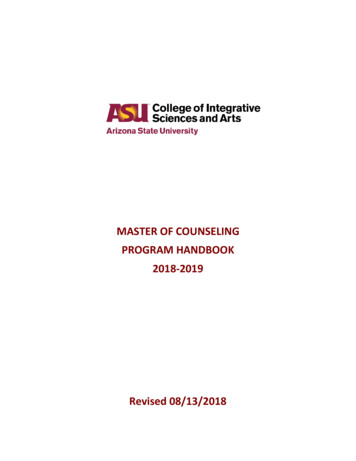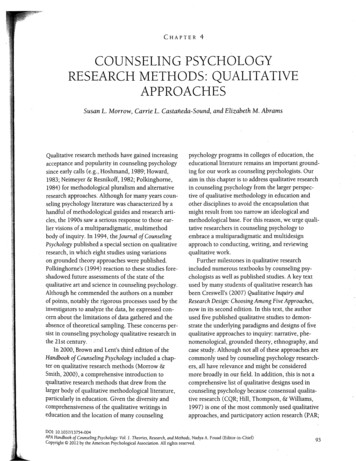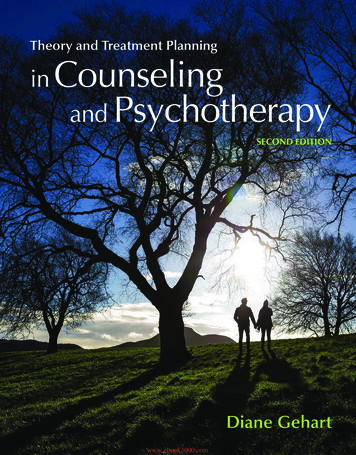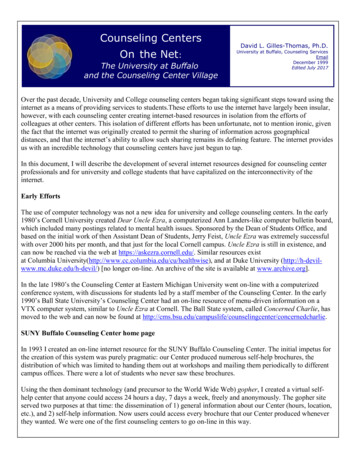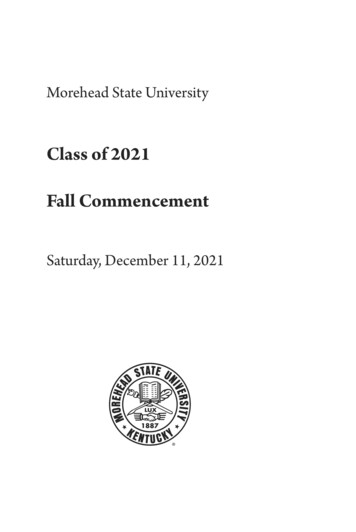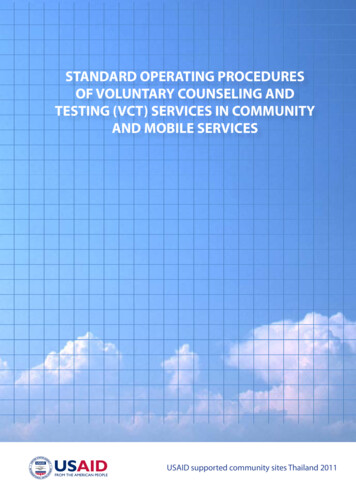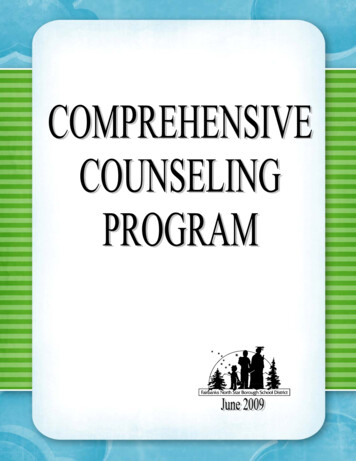
Transcription
ACKNOWLEDGEMENTSThis draft has been the merging of several programs and manuals developed over thelast 10 years in the Fairbanks North Star Borough School District and draws heavilyfrom the work that comes before it. The following documents have greatly assisted inthe development of this draft:The Comprehensive High School Counseling Program – 1998Middle School Counseling Curriculum – 1999Elementary Counseling Resource Manual - 2000Curriculum DepartmentPeggy Carlson - Curriculum DirectorJoyce Bennett - Curriculum CoordinatorKathy Port - Curriculum CoordinatorDebbie Johnson - Materials Development SpecialistWritersAmber BuxtonKathy DoyelPaula Bettano-EvertsGrace FerreiraLinda Skeel-HaenelLynn HoffmanBruce MerrittJoni SimpsonBrian SmithAlice SzuberlaMary Kovis-WatsonSusan Burgess, Facilitator
TABLE OF CONTENTSFoundationMission Statement .Philosophy/Belief Statements .Counselor Role .Benefits of a Comprehensive Counseling Program .Program Standards.33458Delivery SystemsSchool Guidance Program. 9Individual Student Planning . 9Responsive Services. 9System Support . 9Suggested Counselor Time Allotments.10Management SystemsDistrict Wide Advisory Committee .11Yearly Counseling Program Calendar .11Use of Community Resources .11Student Competencies and ActivitiesElementary K-3 .13Elementary 4-6.22Middle/Jr. High.32High School 9-12 .42Accountability .51AppendixDevelopmentally Appropriate Student Competencies: K-12.53Elementary Suggested Activities/Resources .60Middle/Jr. High School Suggested Activities/Resources .70The 16 Career Clusters .7116 Career Clusters and Their Pathways .72Counseling Electronic Resources .75Alaska Cultural Standards for Students.82Alaska Employability Standards .85Child Abuse Reporting Form .86Fairbanks Community Resources .87Action Plan Template .90
FOUNDATION
MISSIONThe mission of the FNSBSD Comprehensive School Counseling Program is toadvocate and provide support for maximum student achievement in the areasof academic, career, and personal/social growth. School counselors work withparents, educators, and the community to provide developmentally appropriateand comprehensive services that meet the needs of all students in order forthem to become productive members of an ever-changing global society.PHILOSOPHY/BELIEFAs counselors of the FNSBSD, we believe:all students are capable of learning, achieving and acquiring knowledgein different ways and at different rates. all students are valued as individuals. all students have a right to, and will benefit from, a comprehensivecounseling program that is culturally and developmentally appropriate. students, with their parents, are responsible for monitoring theireducational progress, assisted by the professional school counselor. and that counselors: help students recognize their learning strengths, weaknesses andpotential.coordinate activities and programs that support the academic mission ofthe school.utilize the strengths of parents and the community and serve as liaisonsbetween parents, the community and the school.serve as leaders in the advocacy of school reform and are key players inschool reform.participate in on-going programs and professional development thatenhance their skills and knowledge.FNSBSD Comprehensive Counseling Program3Mission and Philosophy/BeliefJune 2009
COUNSELOR ROLEAmong the skills that characterize a school counselor,the following are considered essential:SkillDescriptionCounselingSchool counselors spend time on individual and group counseling,crisis intervention, prevention and responsive services.ConsultationSchool counselors acting as consultants can help parents,teachers, and students work together effectively. They seeksolutions to improve the educational/social/emotional experiencefor all students.Coordinationof ServicesSchool counselors coordinate resources and services for studentsand families through community outreach. School counselorscollaborate with agencies to provide a variety of services andopportunities to students and their families.LeadershipSchool counselors seek to make schools a welcoming learningcommunity where all students can achieve academic, career, andpersonal/social success.AdvocacyTeaming andCollaborationSchool counselors are advocates for all students.Counselors collaborate with all school community members.Counselors collaborate most closely with teachers to deliver thecounseling program. In addition, they use professionaldevelopment opportunities to promote the counseling programs tomembers of the educational community and develop collaborativeprojects.Use of DataData provides a method to determine the impact of a schoolcounseling program on student success and school climate.Use ofTechnologySchool counselors are technologically literate and proficient inusing the internet, communicating electronically, and processingdata electronically to better assess student progress and programquality.Adapted from the Alaska School Counseling Framework June 2007FNSBSD Comprehensive Counseling Program4Counselor RoleJune 2009
Benefits of a Comprehensive SchoolCounseling ProgramComprehensive developmental school counseling programs provide a system thatencourages and promotes academic, career, and personal/social development inpreparation for the challenges of the 21st century. School counseling programshave a positive impact on students, parents/guardians, teachers, administrators,boards of education, school counselors, and the community.Benefits for Students: Prepares students for the challenges of the 21st century by acquiringknowledge and skills in academic, career, and personal/social developmentConnects the educational program to future successEnsures student access to the school counseling programPromotes a rigorous academic curriculum for every studentPromotes commitment to learningSupports development of skills to increase student successEnsures equitable access to educational opportunitiesMonitors data to facilitate student improvementFosters advocacy for studentsFacilitates career exploration and developmentBenefits for Parents: Prepares their children for the challenges of the 21st century throughacademic, career, and personal/social developmentProvides support for parents in advocating for their child’s academic, career,and personal/social developmentDevelops a systematic approach for their child’s long-range planning andlearningIncreases opportunities for parent/school interactionProvides training and informational workshopsBenefits for Teachers: Promotes an interdisciplinary team approach to address student needs andeducational goalsPositively impacts school climate and the learning communitySupports classroom instructionIncreases teacher accessibility to the counselor as a classroom presenterand resource personProvides a system for co-facilitation of classroom guidance lessonsEncourages positive, calendared activities and supportive workingrelationshipsAnalyzes data to improve school climate and student achievementFNSBSD Comprehensive Counseling Program5Benefits of a Comprehensive Counseling ProgramJune 2009
Benefits for School Counselors: Provides a clearly defined role and function in the educational systemEliminates non-counseling functionsProvides direct service to every studentProvides a tool for program management and accountabilityRecognizes the school counselors as leaders, advocates, and change agentsEnsures the school counseling program’s contribution to the school’smissionBenefits for Administrators: Aligns the school counseling program with the school’s academic missionAssists administration to use school counselors effectively to enhancelearning and development for all studentsProvides a proactive school counseling curriculum addressing the students’needs and enhancing school climateUses data to jointly develop school counseling goals and school counselorresponsibilitiesProvides a means of evaluating the effectiveness of the school counselingprogramDemonstrates school counseling accountabilityBenefits for Boards of Education: Provides rationale for implementing a comprehensive developmentalcounseling program in the school systemProvides assurance that a quality school counseling program is available toevery studentInforms the community about the school counseling programProvides data about improved student achievementDemonstrates the necessity of appropriate levels of funding forimplementationBenefits for Student Services Personnel: Provides school psychologists and other professional student servicespersonnel with a clearly defined role of the school counselorFosters a positive team approach, which enhances cooperative workingrelationshipsMaximizes collaborative teaming to ensure individual student successUses school counseling program data to maximize benefit to individualstudent growthFNSBSD Comprehensive Counseling Program6Benefits of a Comprehensive Counseling ProgramJune 2009
Benefits for the Community: Provides an increased opportunity for collaboration and participation ofcommunity members with the school programCreates community awareness and visibility of the school counselingprogramConnects the community to the needs of the school and the school to theneeds of the communityEnhances economic development through quality preparation of studentsfor the world of workBenefits for Business and Industry: Increases opportunities for business and industry to participate actively inthe total school programProvides increased opportunity for collaboration among counselors,business, and industryProvides a potential work force with decision-making skills, pre-employmentskills, and increased worker maturityAdapted from theNew York State School Counselor Association (2005). The New York State Model For Comprehensive K‐12 School CounselingPrograms. Leicester, NY: Authorand theMontana State Counselors AssociationFNSBSD Comprehensive Counseling Program7Benefits of a Comprehensive Counseling ProgramJune 2009
PROGRAM STANDARDSThe following standards were developed by the American School CounselorAssociation National Model, and adopted by the Alaska School CounselorAssociation State Model and the Comprehensive Counseling Program for AlaskaPublic Schools. They serve as the foundation of the FNSBSD ComprehensiveSchool Counseling Program, and represent knowledge, attitudes and skills that allstudents will acquire and demonstrate in the areas of academic, career andpersonal/social development as a result of participation in the FNSBSDComprehensive School Counseling Program.Academic Development:Standard A: Students will acquire the attitudes, knowledge and skills thatcontribute to effective learning in school and across the life span.Standard B: Students will complete school with the academic preparationessential to choose from a wide range of substantial post-secondary options,including college.Standard C: Students will understand the relationship of academics to the worldof work and to life at home and in the community.Career Development:Standard A: Students will acquire the skills to investigate the world of work inrelation to knowledge of self and to make informed career decisions.Standard B: Students will employ strategies to achieve future career goals withsuccess and satisfaction.Standard C: Students will understand the relationship between personalqualities, education, training, and the world of work.Personal/Social Development:Standard A: Students will acquire the knowledge, attitudes, and interpersonalskills to help them understand and respect self and others.Standard B: Students will make decisions, set goals, and take necessary actionsto achieve goals.Standard C: Students will understand safety and survival skills.FNSBSD Comprehensive Counseling Program8Program StandardsJune 2009
DELIVERY SYSTEMSCounselors deliver services in four areas: school guidance program, individualplanning, responsive services and system support. The suggested amount oftime that counselors spend in each area is taken from the American SchoolCounselor Association National Model. The student to counselor ratiorecommended by the American School Counselor Association is 250:1.Research (The Student to Counselor Ratio: Does it Matter, Carrell and Carrell,2006) suggests that lower student to counselor ratios have positive effects onthe students in a comprehensive counseling program.A. School Guidance ProgramRepresentative Activities-classroom instruction-interdisciplinary activities-group activities-parent workshops and instructionB. Individual Student PlanningRepresentative Activities-individual or small group appraisal to analyze and evaluatestudents’ abilities, interests, skills and achievement.-individual or small group advisement involving students,parents or guardians and the school in planning studentsprograms that meet their needs.C. Responsive ServicesRepresentative Activities-consultation-individual and small group counseling-crisis counseling/response-referrals-peer facilitationD. System SupportRepresentative Activities-professional development-consultation, collaboration, and teaming-program management and operation-counselors work with a variety of resources; parents,students, community and business leaders, governmentofficials, and school board members are utilized to providecounseling related services to students.FNSBSD Comprehensive Counseling Program9Delivery SystemsJune 2009
COUNSELOR RECOMMENDEDTIME ALLOTMENTSElementaryRecom m endedDelivery idual StudentPlanningResponsiveServices40%10%System SupportRecommendedPercentageGuidance Curriculum(35-45%)35Individual StudentPlanning(5 -10%)10Responsive Services(30-40%)40System Support(10-15%)15100Middle/Jr. HighRecom m endedDelivery idual StudentPlanningResponsiveServices35%20%System SupportRecommendedPercentageGuidance Curriculum(25-35%)30Individual StudentPlanning(15-25%)20Responsive Services(30-40%)35System Support(10-15%)15100High SchoolRecom m ended20%25%25%30%Delivery SystemComponentLegendGuidanceCurriculumIndividual StudentPlanningResponsiveServicesSystem SupportFNSBSD Comprehensive Counseling Program10RecommendedPercentageGuidance Curriculum(15-25%)25Individual StudentPlanning(25-35%)30Responsive Services(25-35%)25System Support(15-20%)20100Suggested Time AllotmentsJune 2009
MANAGEMENT SYSTEMSDistrict Wide Counseling Advisory CommitteeAn advisory committee is a representative group of persons appointed to bothadvise and assist the school counseling program within a school district. TheFNSBSD Counseling Program Advisory Committee is advisory in nature and willoffer suggestions about the counseling program and services, assist withcontinuous evaluation, revision, and improvement of the program, and expressconcerns from the community. Advisory council members reflect the community’sdiversity and include parents or guardians, counselors, business and communitymembers. The council meets twice a year.Yearly Counseling Program CalendarA yearly calendar written by counselors in each school indicates overall counselingactivities in that building. The yearly calendar indicates major activities, dates,and themes for the year. The yearly calendar will be made available to staff,students, and parents.Use of Community ResourcesCounselors will work with a variety of resources to implement the ComprehensiveCounseling Program. Parents, students, community and business leaders,government officials, and school board members are utilized to provide counselingrelated services to students.FNSBSD Comprehensive Counseling Program11Management SystemsJune 2009
ELEMENTARYCOMPETENCIESANDACTIVITIESThe mission of the Elementary School Counseling program in the FairbanksNorth Star Borough is to provide all students with the support, skills, andknowledge necessary for a productive, fulfilling life and career in an evolvingsociety. This is accomplished by creating opportunities in the school andcommunity.
ACADEMICASCA Standard 1: Students will acquire the attitudes, knowledge and skills thatcontribute to effective learning in school and across the lifespan.StudentCompetencies Articulate feeling ofcompetence and confidenceas learnersKGrade 1Grade 2Grade 3 ClassroomGuidance Lessons ClassroomGuidance Lessons ClassroomGuidance Lessons ClassroomGuidance Lessons Display a positive interest inlearning Take pride in work andachievement Accept mistakes asessential to the learningprocess Identify attitudes andbehaviors leading tosuccessful learning Demonstrate how effort andpersistence positively affectlearning Use communications skillsto know when and how toask for help when needed Take responsibility for theiraction Demonstrate the ability towork independently, as wellas the ability to workcooperatively with otherstudents Demonstrate dependability,productivity and initiative Share knowledgeFNSBSD Comprehensive Counseling Program13Elementary (K-3) Competencies and ActivitiesJune 2009
ACADEMICASCA Standard 2: Students will complete school with the academic preparation essentialto choose from a wide range of substantial post-secondary options, including college.StudentCompetenciesKGrade 1Grade 2Grade 3 Seek information andsupport from faculty, staff,family and peers ClassroomGuidance Lessons ClassroomGuidance Lessons ClassroomGuidance Lessons ClassroomGuidance Lessons Use knowledge of learningstyles to positively influenceschool performance (Gr.3 Parent Letters Parent Letters Parent Letters Work w/ClassroomTeachers Work w/ClassroomTeachers Work w/ClassroomTeachers Parent Workshop“Meaning BehindGrades” Become a self-directed andindependent learner (Gr. 3) Parent Letters Work w/ClassroomTeachers Establish challengingacademic goals inelementary, middle/juniorhigh and high school (Gr. 3) Understand the relationshipbetween classroomperformance and success inschool (Gr. 2, 3)FNSBSD Comprehensive Counseling Program14Elementary (K-3) Competencies and ActivitiesJune 2009
ACADEMICASCA Standard 3: Students will understand the relationship of academics to the world ofwork and to life at home and in the communityStudentCompetencies Understand that schoolsuccess is the preparationto make the transition fromstudent to communitymemberKGrade 1Grade 2Grade 3 ClassroomGuidance Lessons ClassroomGuidance Lessons ClassroomGuidance Lessons ClassroomGuidance Lessons Guest Speakers Understand how schoolsuccess and academicachievement enhance futurecareer and vocationalopportunitiesFNSBSD Comprehensive Counseling Program15Elementary (K-3) Competencies and ActivitiesJune 2009
CAREERASCA Standard 4: Students will acquire the skills to investigate the world of work inrelation to knowledge of self and to make informed career decisions.StudentCompetencies Learn about the variety oftraditional andnontraditional occupations Develop an awareness ofpersonal abilities, skillsinterests and motivations(Gr. 3) Learn how to interact andwork cooperatively inteams (Gr. 3) Learn how to set goals(Gr. 3)KGrade 1 ClassroomGuidance Lessons ClassroomGuidance Lessons ClassroomGuidance Lessons ClassroomGuidance Lessons Career ClusterFocus: LawEnforcement,Public Safetyand Security Health Science Education andTraining Career ClusterFocus: LawEnforcement,Public Safetyand Security Health Science Education andTraining Career ClusterFocus: Agriculture, Foodand NaturalResources Transportation,Distribution andLogistics Career ClusterFocus: Agriculture, Foodand NaturalResources Transportation,Distribution andLogisticsFNSBSD Comprehensive Counseling Program16Grade 2Grade 3Elementary (K-3) Competencies and ActivitiesJune 2009
CAREERASCA Standard 5: Students will employ strategies to achieve future career goals withsuccess and satisfaction.StudentCompetencies Identify personal skills,interests and abilities, andrelate them to currentcareer choice Know the various wayswhich occupations can beclassified Demonstrate awareness ofthe education and trainingneeded to achieve careergoalsKGrade 1 ClassroomGuidance Lessons ClassroomGuidance Lessons ClassroomGuidance Lessons ClassroomGuidance Lessons Career ClusterFocus: LawEnforcement,Public Safetyand Security Health Science Education andTraining Career ClusterFocus: LawEnforcement,Public Safetyand Security Health Science Education andTraining Career ClusterFocus: Agriculture, Foodand NaturalResources Transportation,Distribution andLogistics Career ClusterFocus: Agriculture, Foodand NaturalResources Transportation,Distribution andLogisticsFNSBSD Comprehensive Counseling Program17Grade 2Grade 3Elementary (K-3) Competencies and ActivitiesJune 2009
CAREERASCA Standard 6: Students will understand the relationship between personal qualities,education, training and the world of work.StudentCompetencies Identify personalpreferences and interestswhich influence careerchoices and success Learn to work cooperativelywith others as a teammemberKGrade 1 ClassroomGuidance Lessons ClassroomGuidance Lessons ClassroomGuidance Lessons ClassroomGuidance Lessons Career ClusterFocus: LawEnforcement,Public Safetyand Security Health Science Education andTraining Career ClusterFocus: LawEnforcement,Public Safetyand Security Health Science Education andTraining Career ClusterFocus: Agriculture, Foodand NaturalResources Transportation,Distribution andLogistics Career ClusterFocus: Agriculture, Foodand NaturalResources Transportation,Distribution andLogisticsFNSBSD Comprehensive Counseling Program18Grade 2Grade 3Elementary (K-3) Competencies and ActivitiesJune 2009
PERSONAL/SOCIALASCA Standard 7: Students will acquire the knowledge, attitudes, and interpersonal skills tohelp them understand and respect self and others.StudentCompetencies Develop positive attitudestoward self as a unique andworthy person Understand change is apart of growth Identify and ExpressFeelings Distinguish betweenappropriate andinappropriate behaviors Recognize personalboundaries, rights andprivacy needs Understand the need forself-control and how topractice it (Gr. 1, 2, 3)KGrade 1Grade 2Grade 3 ClassroomGuidance Lessons ClassroomGuidance Lessons ClassroomGuidance Lessons ClassroomGuidance Lessons Support Groups Support Groups Support Groups Support Groups Individual andsmall groupcounseling Individual andsmall groupcounseling Individual andsmall groupcounseling Individual andsmall groupcounseling Demonstrate cooperativebehavior in groups (Gr. 3) Use effectivecommunications skills(Gr. 2, 3) Know that communicationinvolves speaking, listeningand nonverbal behavior Learn how to make andkeep friends Recognize, accept, andappreciate ethnic andcultural diversity (Gr.3)FNSBSD Comprehensive Counseling Program19Elementary (K-3) Competencies and ActivitiesJune 2009
PERSONAL/SOCIALASCA Standard 8: Students will make decisions, set goals and take necessary action toachieve goals.StudentCompetenciesKGrade 1Grade 2Grade 3 Understand consequencesof decisions and choices(Gr. 3) ClassroomGuidance Lessons ClassroomGuidance Lessons ClassroomGuidance Lessons ClassroomGuidance Lessons Identify alternativesolutions to problems(Gr. 3) Support Groups Support Groups Support Groups Support Groups Individual andsmall groupcounseling Individual andsmall groupcounseling Individual andsmall groupcounseling Individual andsmall groupcounseling Develop effective copingskills for dealing withproblems (Gr. 3) Demonstrate when, whereand how to seek help forproblem solving problemsand making decisions Know how to apply conflictresolution skills Demonstrate a respect andappreciation for individualand cultural differences(Gr. 3)FNSBSD Comprehensive Counseling Program20Elementary (K-3) Competencies and ActivitiesJune 2009
PERSONAL/SOCIALASCA Standard 9: Students will understand safety and survival skills.StudentCompetencies Demonstrate knowledge ofpersonal information (i.e.,telephone number, homeaddress, emergency contact) Learn about therelationship between rules,laws, safety and theprotection of rights of theindividualKGrade 1Grade 2Grade 3 ClassroomGuidance Lessons ClassroomGuidance Lessons ClassroomGuidance Lessons ClassroomGuidance Lessons Support Groups Support Groups Support Groups Support Groups Individual andsmall groupcounseling Individual andsmall groupcounseling Individual andsmall groupcounseling Individual andsmall groupcounseling Learn about the differencesbetween appropriate andinappropriate physicalcontact Demonstrate the ability toset boundaries, rights andpersonal privacy Differentiate betweensituations requiring peersupport and situationsrequiring adult professionalhelp Identify resource people inthe school and community,and know how to seek help Apply effective problemsolving and decision –making skills to make safeand healthy choices(Gr. 2, 3)FNSBSD Comprehensive Counseling Program21Elementary (K-3) Competencies and ActivitiesJune 2009
ACADEMICASCA Standard 1: Students will acquire the attitudes, knowledge and skills thatcontribute to effective learning in school and across the lifespan.StudentCompetencies Articulate feeling ofcompetence and confidenceas learnersGrade 4 Classroom GuidanceLessonsGrade 5 Classroom GuidanceLessonsGrade 6 Classroom GuidanceLessons Display a positive interest inlearning Take pride in work andachievement Accept mistakes as essentialto the learning process Identify attitudes andbehaviors leading tosuccessful learning Demonstrate how effort andpersistence positively affectlearning Use communications skillsto know when and how toask fro help when needed Take responsibility for theiraction Demonstrate the ability towork independently, as wellas the ability to workcooperatively with otherstudents Share knowledgeFNSBSD Comprehensive Counseling Program22Elementary (4-6) Competencies and ActivitiesJune 2009
ACADEMICASCA Standard 2: Students will complete school with the academic preparation essentialto choose from a wide range of substantial post-secondary options, including college.StudentCompetencies Demonstrate the motivationto achieve individualpotential (Gr. 6) Learn and apply criticalthinking skills (Gr. 5, 6)Grade 4Grade 5 Classroom GuidanceLessons Classroom GuidanceLessons Parent Workshop“Meaning Behind Grades” Parent Workshop“Meaning Behind Grades” Apply the study skillsnecessary for academicsuccess at each levelGrade 6 Career Guidance Lesson:WIN (beginning 20102011) instructionalsoftware that allowsstudents to practice skillstested on the WINBenchmark Assessment Career Trek Seek information andsupport from faculty, staff,family and peers Transition ActivitiesRegistration for 7th grade Organize and applyacademic information from avariety of sources Orientation Class Meeting Guest Speakers Parent Workshop“Meaning Behind Grades” Use knowledge of learningstyles to positively influenceschool performance(Gr. 5, 6) Become a self-directed andindependent learner (Gr. 4) Establish challengingacademic goals inelementary, middle/juniorhigh and high school Use assessment results ineducational planning (Gr. 6) Understand the relationshipbetween classroomperformance and success inschoolFNSBSD Comprehensive Counseling Program23Elementary (4-6) Competencies and ActivitiesJune 2009
ACADEMICASCA Standard 3: Students will understand the relationship of academics to the world ofwork and to life at home and in the communityStudentCompetencies Seek co-curricular andcommunity experience toenhance the schoolexperience (Gr. 5, 6)Grade 4Grade 5Grade 6 Classroom GuidanceLessons Classroom GuidanceLessons Classroom GuidanceLessons
FNSBSD Comprehensive Counseling Program 6 Benefits of a Comprehensive Counseling Program June 2009 Benefits for School Counselors: Provides a clearly defined role and function in the educational system Eliminates non-counseling functions Provides direct service to every student Provides a tool for program management and accountability
